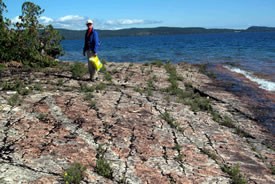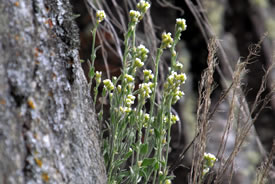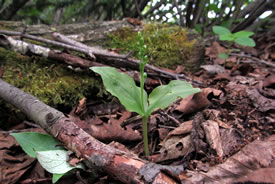Powder Islands adventure

Susan Bryan checks the plants on a section of rock pavement (Photo by Mike Bryan)
"I haven’t seen that before. It's a lifer!" You may be thinking birds, but for me the "lifer" was a delicate plant with white blossoms growing in a crack on a bare cliff face. Hoary draba is a member of the mustard family and usually found in the mountains of western Canada, the Yukon and Alaska. This is a plant that likes harsh conditions!
In Ontario it is very uncommon, with records from a handful of locations on the north shore of Lake Superior, from Manitoulin Island and the Bruce Peninsula, and from a cliff near Ottawa. So this “lifer” was an exciting find!

Hoary draba (Photo by Mike Bryan)
I am an amateur botanist and naturalist, and I spend a lot of my free time exploring the forests and waterways of northern Ontario, where I live. In the summer of 2014 I volunteered to help with a Natural History inventory of the Nature Conservancy of Canada's new Powder Islands property. This was a great opportunity for me to visit an interesting new location out in Lake Superior while also contributing to scientific knowledge of the area.

Auricled twayblade (Photo by Mike Bryan)
In addition to hoary draba, there were other discoveries on the Powder Islands. We found a rare orchid, the auricled twayblade, growing in the hundreds under alder bushes on the exposed shore. A vivid clump of what looked like tiny purple umbrellas was another surprise: it proved to be a rare moss that only grows on moose dung, called moose moss!
Finding and documenting the saga of human activities on the islands was almost as interesting as the natural history. We found the remains of four cabins on the islands, complete with old appliances, newspapers, dishes, and memories left behind. Boom logs and huge chains from the Lake Superior log drive days still lie on the shore. An open area in the forest and an old cart track are all that remain of a storage site for blasting powder. The site dates all the way back to the building of the Canadian Pacific Railway in the 1880s. It’s how the Powder Islands got their name.
Participating in this inventory project was a fascinating way to be a modern-day explorer in a little known location. I learned a lot, enjoyed the outdoors and the adventure, saw some interesting natural history, and also got that exciting "lifer"!

